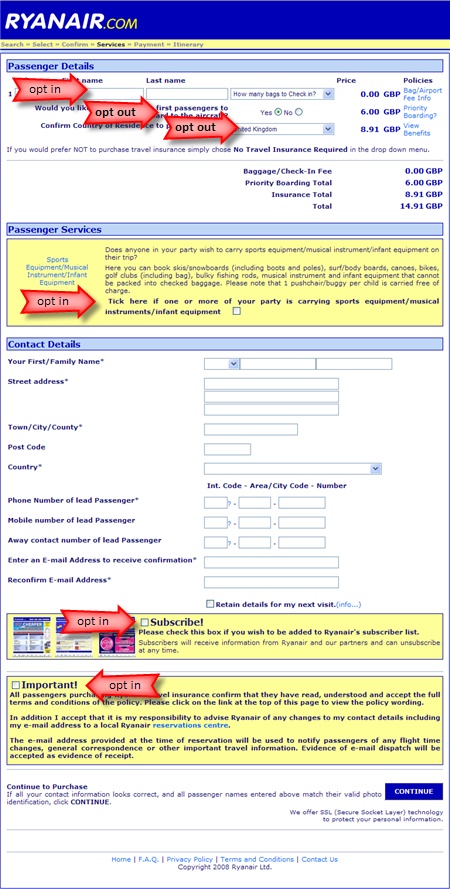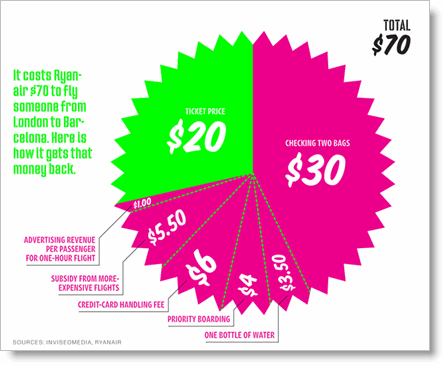The debate about the ethics of opt in / opt out defaults in web forms never seems to go away. If you’ve read Chris Anderson’s Wired Article “Free! Why $0.00 Is the Future of Business“, then you might know where I’m going with this: Ryanair.
To quote from the article: “how can a flight across the English Channel be cheaper than the cab ride to your hotel?
- Cut costs: Ryanair boards and disembarks passengers from the tarmac to trim gate fees. The airline also negotiates lower access fees from less-popular airports eager for traffic.
- Ramp up the ancillary fees: Ryanair charges for in-flight food and beverages; assesses extra fees for preboarding, checked baggage, and flying with an infant; collects a share of car rentals and hotel reservations booked through the Web site; charges marketers for in-flight advertising; and levies a credit-card handling fee for all ticket purchases.
- Offset losses with higher fares: On popular travel days, the same flight can cost more than $100.”
Put simply, they are skating a fine line and have to work very hard on their upsell for ancillary fees (point 2 above). This boils down to the interaction design of their upsell page.
The way they do this is by alternating between default states of opt-in and opt-out for the choices on the upsell page. Easyjet also does the same thing. This is ethically dubious.

I can understand their argument for doing this. In their minds, travel insurance and priority boarding are highly desirable products and they preselect them to save the user effort. To them, it’s persuasive salesmanship: “We have a number of options here for you sir, but we highly recommend priority boarding and insurance.”
However, there is a dark side to this design decision. You could argue that rather than being persuasive, it’s just plain sneaky. How would you feel if, when doing your weekly grocery shopping at the supermarket, one of the staff sneaked something into your basket. You’d be free to take it out as it rolled along the conveyor belt, but only if you were paying attention. And an extra tin of beans with your groceries, or travel insurance with your flight is a small additional cost so it’s very likely to slip by unnoticed.
You could liken it to old-fashionned bazzar-style bartering, where people who have their wits about them will a get lower price. Personally, I’m not so sure. While it might be a grey area, one way or another it’s going to annoy some customers. In the Independent last saturday, James Daley referred to the purchase process on Ryanair as an “enraging experience”. Others agree.

Pingback: Dark Patterns: dirty tricks designers use to make people do stuff- 90 Percent of Everything
Pingback: User Interfaces Designed to Trick People | Serving Niches Blog